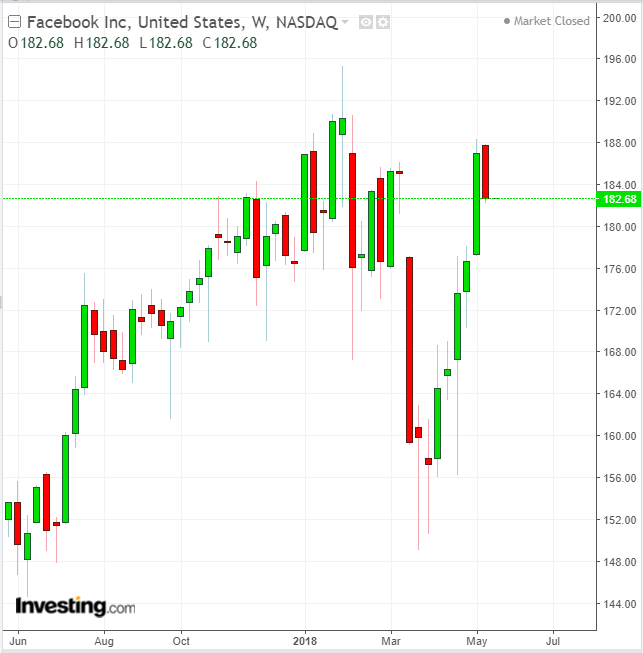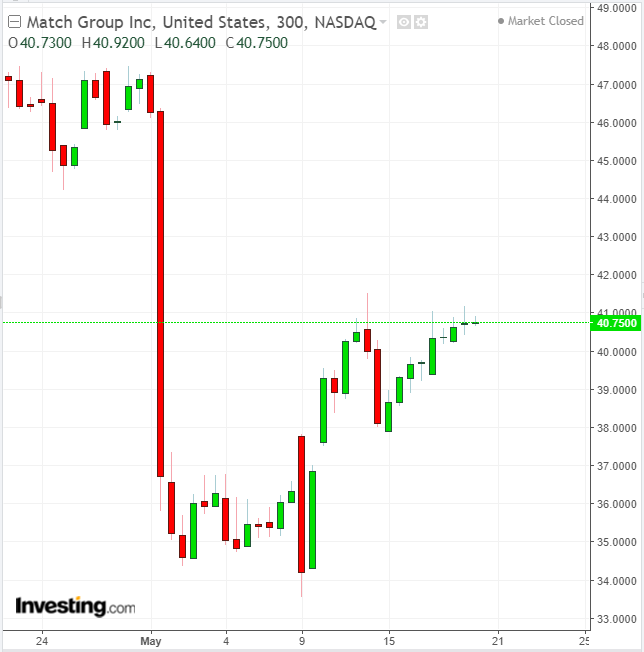Facebook (NASDAQ:FB) is back in the game. After being decimated by government probes, data privacy breaches and analyst downgrades during the past several weeks, its shares are now rapidly approaching its record high, a bit above $195, which the stock hit in February.

Facebook stock, which closed at $185.09 on March 16 just before the Cambridge Data Analytics data breach news broke, has gained 22% from the lowest point that month. It’s now just 6% shy of its record high of $195.43.
Is this a dead cat bounce? Or is this the beginning of an another powerful rally for the social media giant which is still scrambling to put its house in order amid unprecedented scrutiny by regulators and media on its data privacy practices?
In this post we'll take a deeper look at what's driving the stock now, to determine the catalysts that have fueled these gains.
Strong Earnings Momentum
Facebook shares sank in mid-March after revelations that Cambridge Analytica scraped data on tens of millions of FB users without their consent. The stock plunged as analysts downgraded it on concerns that the company won’t be able to sustain its earnings momentum if it was forced to change its ad model.
The primary power of Facebook’s platform is that it helps companies target their ads to the right audience for each product or service. This monetization of user data is the key to Facebook's success and to the continued upward trajectory of its share price. Q1 2018 earnings suggest that this model is not only intact, but that it's thriving.
During the past quarter, which saw the rise of the #deleteFacebook campaign in response to the breach, as well as a congressional inquiry and a major change to Facebook's News Feed algorithm, the company's revenue rose 49% to $11.97 billion. Daily active users grew 13% to 1.45 billion, matching analyst estimates on this key measure of engagement.
It’s still too early to predict whether Facebook will emerge completely unscathed from the fallout of the Cambridge Analytica scandal and the changes it’s introducing to make its platform more credible, but the first quarter numbers show that Facebook’s dominant position in the social ad market remains unchallenged. For example, its ad revenue from mobile made up 91% of the total for this metric in the most recent period, compared with about 85% a year earlier.
The company also has plenty of properties which it’s only now starting to monetize. This includes the popular WhatsApp chat app and Messenger.
One main reason Facebook stands out among other social media companies is its ability to reach users of all age groups. For teenagers, the company owns Instagram—which it acquired for a mere $1 billion in 2012 when everyone thought it was a bad purchase. Instragram, the photo-sharing app, is expected to reach a billion users this year, even as its rival, Snapchat (NYSE:SNAP), continues struggling to make money and find a profitable direction.
Another positive surprise that came to light from Facebook's first quarter earnings report: it has reversed the slide in its user numbers for North America. Monthly active users in the U.S. and Canada rose to 241 million, while daily active users climbed to 185 million in the first quarter, following the decline that occurred for the first time ever in the fourth quarter of 2017.
There are still a lot of avenues that Mark Zuckerberg and company can explore to expand Facebook’s revenue base. Early this month, for example, he announced the launch of a dating app to help connect people who aren't Facebook friends and are looking for partners. This move also shows how Facebook could potentially leverage its extensive web of connections among people and data, to foster additional types of relationships.

As well, it indicates how Facebook's massive financial resources can be used to compete with incumbents. The news sent shares of Match Group (NASDAQ:MTCH)—which owns and operates the Tinder dating app as well as Match.com and the OKCupid dating platform and is the current leader in this niche—tumbling 20%, the most for the stock in a single day. Indeed, Match's share price has still not recovered from the unexpected news.
The Bottom line
It’s tough to predict what the short-term direction is for any company’s stock. However, by considering the speed of Facebook’s rebound over the past eight weeks, it’s safe to say that the worst certainly looks to be over for the social media behemoth. Indeed, short-sellers will now have to look elsewhere in order to make a killing.
Investors, however, should keep in mind that it's likely there won’t be straight line appreciation from here, especially when the company is still in the middle of a major restructuring and many governments are still contemplating ways strengthen online privacy regulation. That said, the global uproar over data privacy has done little to diminish Facebook's businesses or user metrics. At the end of the day we believe its stock still has tremendous appeal for long-term investors.
